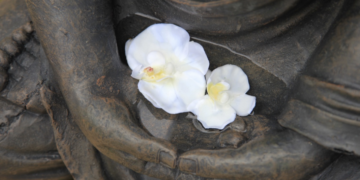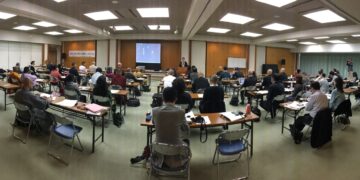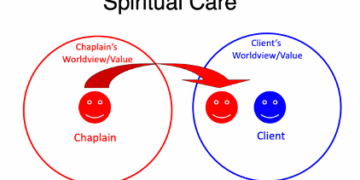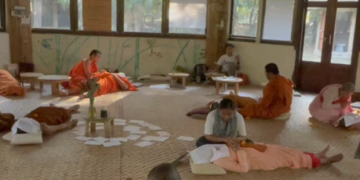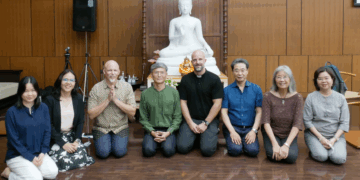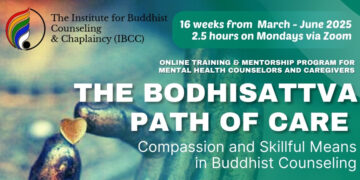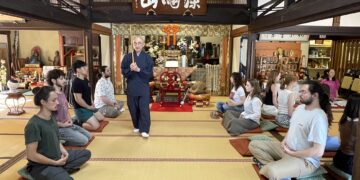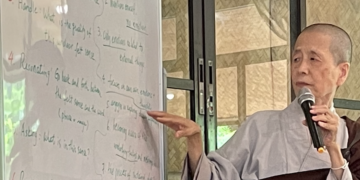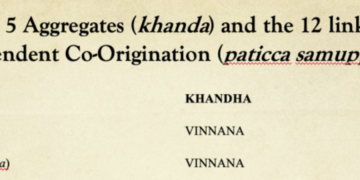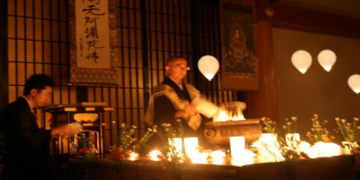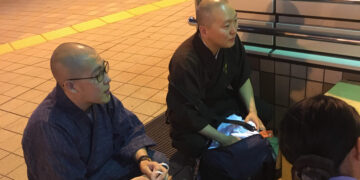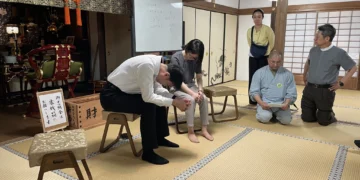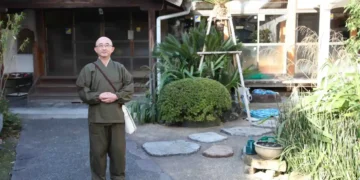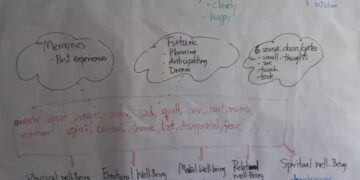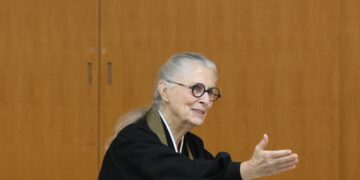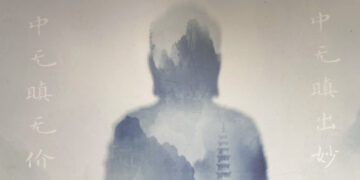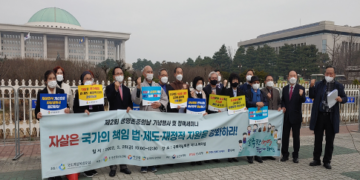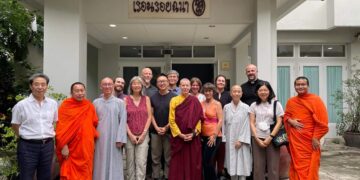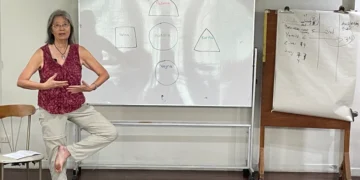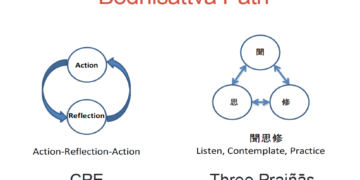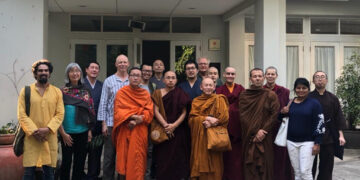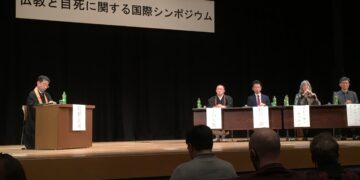3rd Round 2021-22
Schedule: 8 Monthly Zoom Sessions of 2-2.5 hours
- #1 October 22, 2021: Personal Introductions, Sharing of Interests and Concerns, Setting of Themes and Schedule
- #2 November 19: Neurobiology and Mindfulness with Jinji Eika Willingham (U.S.A.) and Dr. Prawate Tantipiwatanaskul (Thailand). Dr. Prawate will focus on the neurobiology of trauma, how the brain and memory process in trauma, and how mindfulness helps in the healing process. Jinji will focus on how she translates and incorporates mindfulness into Buddhist-based psychotherapy for clients with trauma/PTSD through implicit or explicit awareness of neurobiology, systems, and helping them develop the experiential practice of self-regulation and co-regulation (neuroception) to maintain connection with others.
- #3 December 17: Buddhist Chaplaincy in North America, Japan, and Beyond with Rev. Fuminobu Komura (Japan/U.S.A.) and Prof. Elaine Yuen (U.S.A.). Rev. Komura will discuss his path to becoming a Buddhist chaplain, how chaplaincy is the Buddhist path, and how he regards the role of prayer in his chaplaincy work. Elaine will discuss Mapping Buddhist Chaplains in North America – Chaplaincy Innovation Lab (see their organizational HP here). Buddhist-trained chaplains are increasingly becoming a presence in North America, and this project is a first step in documenting chaplains’ Buddhist identities, their professional and clinical education, and where and how they are employed.
- #4 January 21, 2022: Buddhist Meditation Practice for the Traumatized and Mentally Ill with Ven. Zinai (Taiwan) and Rev. Soin Fujio (Japan). Ven. Zinai will present various meditation Vipassana practices: 1) using visual ‘Open Focus’ to shift the mode of a narrow focus to open focus, 2) short version of practicing mindfulness in body, feelings, minds, and thoughts, 3) mindfulness of breathing meditation, and 4) discerning impermanence and non-self in mindfulness of breathing and body scan. She will also give a short introduction on how to help meditators to overcome their negative/traumatized experiences using Eugene Gendlin’s ‘Focusing’ method. Rev. Fujio has worked with the suicidal and mentally ill for many years. He will present not only on Za-zen, practiced while sitting on a cushion or chair, but also Do-zen, Zen meditation through movement, based on his 40 year practice of Tai-Chi as a master of Yan Ming-Shi school. He will also briefly introduce Ritsu-zen, Zen meditation in a standing position, and Ga-zen, Zen meditation in a lying or sleeping position.
- #5 February 18: Suicide Prevention & Spiritual Friendship (kalyanamitra 善知識) with Rev. Gustav Ericsson (Sweden) and Jonathan Watts (USA/Japan). Gustav will speak on the significance of friendship on the spiritual path, building from an etymological exploration of the word religion, traditional and contemporary images of pastoral care, as well as Buddhist and Christian scriptural references to the significance of friendship on the spiritual path. He will also present examples and reflections from his years of pastoral counseling and service in the Church of Sweden’s suicide prevention helpline, as an invitation to discussion and sharing on the meaning and relevance of friendly connection in suicide prevention work and spiritual/contemplative counseling. Jonathan will present on this situation of suicide in Japan, especially its structural and cultural factors. He will then present the work of a number of individual priests, including Rev. Fujio, on the issue and how this has built into a national network of priests supporting one another in their work and engaging in collective activities and training of new priests.
- #6 March 25: Family Systems Therapy & Mentalization—Practicing Mindfulness and Vipassana in the Family with Jinji Willingham (USA) and Rev. Masazumi Okano (Japan). Jinji will discuss the three components of her therapeutic orientation and clinical model – the dharma, family systems, and neuroscience (the neurobiology of relational attachment, its impact on the autonomic nervous system which impacts mental health, esp. trauma, mood disorder, and self-harming behaviors). She will discuss how they are aligned and how they emerge and how I integrate them in clinical work. Rev. Okano will give a talk entitled “Mentalization—Practicing Mindfulness and Vipassana in the Family.” The concept of mentalization originates in psychoanalysis, and, since the early 1990s, the Hungarian-born psychologist Peter Fonagy and his colleagues have revitalized it, making it relevant and applicable for the everyday lives of families. Normally these meditations are practiced in order to be aware of one’s own mental and physical processes but we could purposefully apply them to enhance mentalization. This could contribute not only to enhancing children’s inter-relational skills but also the skills of those who are engaged in various care-giving activities. I am aware that these meditations are already practiced for the purposes similar to what I just mentioned but it may be useful to apply the ideas of mentalization in order to open up new dimensions to mindfulness and vipassana.
- #7 April 15: Suicide Prevention in South Korea with Prof. Pumsoo Lee and two colleagues: Prof. Seunghee Lim who holds a Ph.D from Birmingham University and is presently a professor at the Shinhan University Social Welfare Department. She is also the President of the Korean Academy of Culture for Life. Prof. Myoung Ho Hyun is a clinical psychologist and Professor in the Department of Psychology at Chuna-Ang University. Prof. Lee will speak specifically on the 2nd Life Respect Day Celebration and Policy Seminar sponsored by the Korea Life Movement Union.
- #8 May 20: Maitri Space Awareness with Prof. Elaine Yuen (U.S.A.). This practice evolved from the Tibetan yoga tradition by Chogyam Trungpa Rinpoche. Developed in the early 1970s, Maitri Space Awareness practice is built around the mandala of the five buddha families, illustrating how the ordinary world of mind and emotions is full of wakefulness as well as confusion. The word Maitri is a Sanskrit word that translates as “loving kindness” or “unlimited friendliness toward self and others”. The practice of Maitri Space Awareness is intended to evoke inherent compassion and offers the opportunity to be with experience from a ground of non-aggression. Maitri Space Awareness has been taught as workshops, and is also a core element of the MA Counseling degrees at Naropa University.
- #9 & 10 June 22 & July 22: A wide-ranging discussion amongst everyone in the group without a main presenter on: Teaching Meditation: from physical comportment to psycho-spiritual balance and insight & How do you evaluate the development of your meditation students and those that you work with?
- #11 October 14: Focusing with Rose Sposito (U.S.A.). Rose is a longtime Buddhist practitoner and became a student of Chogyam Trungpa Rinpoche in 1975. She teaches four Focusing levels to spiritual and psychotherapy practitioners and to the general public.
- #12 November 18: “Wise Hope” with Roshi Joan Halifax, Buddhist teacher, Founder and Head Teacher of Upaya Zen Center in Santa Fe, New Mexico, a social activist, and author. In her early years, she was an anthropologist at Columbia University (1964-68) and University of Miami School of Medicine (1970-72). She is a pioneer in the field of end-of-life care. She has lectured on the subject of death and dying at many academic institutions and medical centers around the world.
- #13 January 20, 2023: Wellbeing and Social Movement Building with Ouyporn Khuankaew, a Buddhist feminist activist and has been a workshop facilitator in Asia since 1995. She facilitates workshops on feminist counseling, sexuality and anti-oppression, peacebuilding, and nonviolent direct action with Thai NGOs and government workers as well as with regional and international participants. She also guides meditation retreats for activists. Prior to the International Women’s Partnership for Peace and Justice (IWP), she ran the gender program of the International Network of Engaged Buddhists.
- March 15, 2024: Exploring the Intersections between Gendlin’s Focusing Therapy & the Buddha’s Teachings of the Five Aggregates & Dependent Co-origination with Ven. Zinai and Jonathan S. Watts. Ven. Zinai (Taiwan) was ordained in 1983 by the renowned bhiksuni Master Wuyin and Venerable Xinzi. Her works focuses on integrated Buddhist Abhidhamma studies, mindfulness meditation practice, creative education method based on Image Theory, and Satir’s Family Therapy Model. Jonathan S. Watts (U.S.A./Japan) studied and practiced at the forest monastery of Buddhadasa Bhikkhu in Thailand during the 1990s. Since 2006, he has helped to develop Japan’s first Buddhist chaplaincy training program, the Rinbutsuken Institute of Engaged Buddhism, where he teaches Buddhist social analysis and systems care.

List of Themes and Interests
- Inter-Mindfulness or Relational Mindfulness Practice including certain aspects of Vipassana. Instead of merely guided mindfulness practice, learning how to interactively participate in the process of exploring posture, sensation, perception, interior and exterior environments, gaining awareness of embodied feelings, and interactions during practice making it more collaborative, relational, and intimate.
- Further developing other Buddhist contemplative practices: paramitas, self-liberating awareness, etc.
- Family Systems Therapy (especially in the era of COVID)
- Caring for Carers: supporting medical and psychological caregivers suffering extreme burnout in this time as well as supporting each other
- Self-regulation & Self-care and Restoration
- Youth: Young people are an especially vulnerable group in this era
- Grief & Bereavement: COVID has taken many lives quickly and in isolated medical environments further exacerbating grief.
- Training Buddhist chaplains & the continual spiritual character development of the caregiver
- Contextualizing Buddhist chaplaincy to local cultural, economic, and political environments
Participant Profiles
General Goals (to be further clarified by the group)
- to deepen our understandings and practices in our field of work through high-level mutual interaction (which will include not only discussion but sharing of contemplative practices during sessions)
- to develop a sangha of high-level practitioners that can support each other as we confront challenges in our own work
- to clarify and reinforce Buddhist concepts and practices being used in mainstream society and the psycho-spiritual care movement that are becoming diluted and taken out of context
- to promote Buddhist chaplaincy in Asia (with the support INEB)
- to deepen Buddhist chaplaincy in the West as Buddhism is not firmly planted there
Background
After a decade of researching, documenting, and promoting the work of suicide prevention Buddhist priests in Japan, we at the International Buddhist Exchange Center (IBEC) @ Kodosan held an international conference in Yokohama on this issue in conjunction with Ryukoku University in Kyoto in 2017. A group of some 20 internationals and 30 Japanese gathered for a week, shared a wide number of case studies, and engaged in lengthy discussions on the issues. The full conference report is available here in English & Japanese. In 2019, we held a second round of these discussions in Bangkok at the headquarters of the International Network of Engaged Buddhists (INEB) on the wider themes of Buddhist psychology and psycho-therapy. A smaller more intimate meeting of 30 people in total meant there was more focus on discussion as well as some small workshops on methods, especially amongst the large number of monastics at the meeting. Again a full meeting report is available here in English & Japanese. The COVID pandemic obviously shut down many of our plans for further face-to-face interaction for 2020, but it has been remarkable to see how many new relationships from these two meetings have spawned new initiatives and meetings over the past few years, especially in India and Japan.
From this foundation, we would like to move forward in 2021-22 with a 3rd Round of explorations on these issues with a basic set of questions as follows:
- What are the contributions Buddhist teachings, Buddhist teachers, and Buddhist institutions can make to contribute to psycho-spiritual health during this very difficult era?
- While clinical and health care institutions may be important places of encounter in some countries, especially the United States, they are not as readily accessible for Buddhist chaplains and volunteers in other countries, especially Japan. Therefore we would like to see how this work can be done in a variety of settings, such as within the family, the community, and the temple, as well as a variety of situations, such as during natural disaster, as suicide prevention, as end-of-life care and grieving, for students and young adults, etc.
- How can the ideas from the above two areas help to form a training system for not only professional chaplains but also volunteers, rank-and-file ordained persons, and engaged lay persons? INEB, which serves as a general umbrella for this work, has expressed interest in supporting such training sessions for candidates from a wide range of countries.
In terms of the process of this 3rd round, we will develop a series of intimate, private zoom webinars over the next 6 months – 1 year amongst a group of 13 persons who are largely alumni from the first two meetings. From this foundation, and with some hope that 2022 will see a decline in COVID and the ability for some travel, we would like to be able to hold a 3rd conference with a level of dynamic interaction and workshops.

